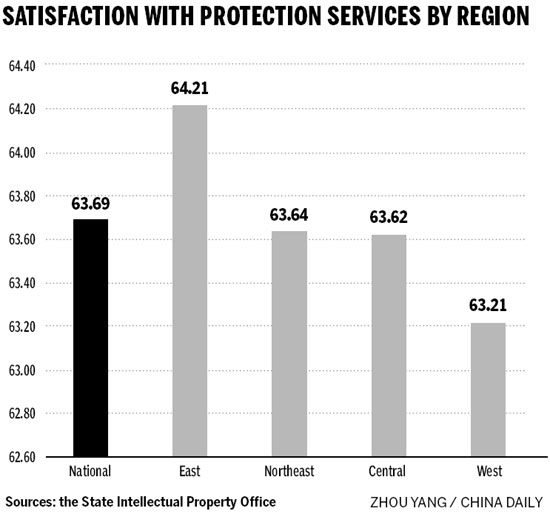Enforcement and protection are the two top intellectual property issues in China, according to a nationwide survey unveiled in late April.
The first of its kind in the country, the survey found respondents were most dissatisfied with the severity of infringements, delay and inconvenience in dealing with IP disputes, and inadequate remedies for damages.
The survey was jointly sponsored by the national trade association of patents, trademarks and copyrights as well as other institutions. It took four months to compile, and it covered four municipalities along with 27 provincial capitals.
A questionnaire was administered to more than 120,000 IP professionals, rights owners and ordinary people on the Web, via email, or by telephone. Nearly 16,300 responses were received.
More than half of the respondents reported serious infringements, whereas 24 percent said they believed that the number of infringements has gone down in recent years.
Some 48 percent of them considered compensation for damages inadequate and untimely.
The data show that there is still a gap between the level of enforcement and public expectations, organizers said, suggesting that authorities explore diverse, faster and more cost-effective ways to settle disputes.
At the same time, rights owners reported higher satisfaction with IP services than professionals and ordinary people.
In particular, younger respondents with a higher educational background tended to express more dissatisfaction. The reason may be that this group has more opportunities to engage in creative work and thus have a better understanding of IP value, the survey speculated.
Compared to other types of enterprises such as State-owned companies and private businesses, foreign-funded firms reported slightly higher satisfaction.
In terms of differences across regions, cities in which respondents reported higher satisfaction with IP services were mainly concentrated in the developed eastern part of the country. Of the top 10 cities, seven were in East China, while half of the lowest-ranked 10 cities were in the western region.
There were 11 cities that each scored higher than the national average of 63.69, and 26 cities received acceptable scores.
However, the survey results show that satisfaction is not necessarily tied to economic development.
For instance, Beijing ranked 20th, and southern metropolis Guangzhou took 22nd.
Organizers said they will give priority attention to the relationship between economic development, IP demands, infringement tolerance and protection expectations in future surveys.
In contrast to their obvious dissatisfaction with enforcement and protection, respondents had high opinions about IP training and promotion.
Nearly 80 percent of them believe that there has been growing publicity about intellectual property protection in recent years.
However, the effect of these efforts may be limited, according to the survey. Some 28 percent of respondents claimed that they are knowledgeable about IP and even fewer, 18 percent of the total, are clear about the responsibilities of major IP administrations.
[email protected]

(China Daily 05/22/2013 page17)

